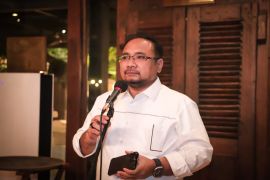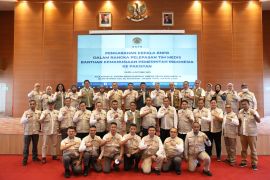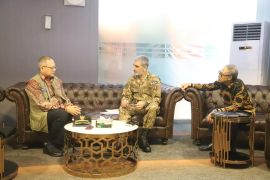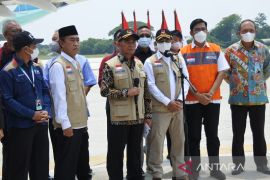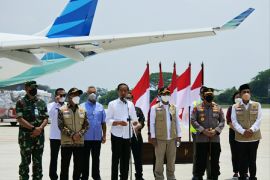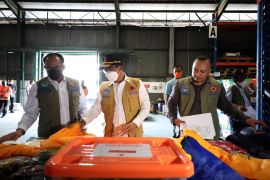It was unclear if the move Thursday was intended as a threat, but it showed the extent of the task facing US Senator John Kerry as he prepares to embark on a mission to shore up badly strained ties with Washington`s nuclear-armed ally.
Washington did not inform Islamabad that an elite team of Navy SEALs had helicoptered into the garrison town of Abbottabad until the commandos had cleared Pakistani airspace, carrying with them bin Laden`s corpse.
The covert May 2 raid has plunged Pakistani politics into turmoil with both President Asif Ali Zardari and Prime Minister Yousuf Raza Gilani facing calls to resign amid growing anti-American sentiment.
Gilani chaired a defence committee meeting Thursday that decided "to institute an inter-agency process to clearly define the parameters of our cooperation with the US in counter-terrorism," an official statement said.
This would be done "in accordance with Pakistan`s national interests and the aspirations of the people," according to the statement, which condemned "US unilateral action in violation of Pakistan`s sovereignty."
Washington is pressing Islamabad to investigate how bin Laden and several wives and children managed to live for five years under the noses of its military in a town just 40 miles (65 kilometers) north of the capital.
CIA director Leon Panetta laid bare the mistrust between the allies when he said the United States did not warn Pakistan in advance about the raid because it feared Pakistani officials would have alerted the Al-Qaeda chief.
In an interview with Time magazine, Gilani spoke repeatedly of the "trust deficit" between the two nations and explained that as an elected politician he must choose the Pakistani people over good ties with the United States.
"If public opinion is against you, then I cannot resist it to stand with you. I have to go with public opinion," he said.
Addressing parliament on Monday, Gilani warned against further unilateral US strikes on Pakistani soil, but the White House has said that President Barack Obama reserves the right to act again against fugitives in Pakistan.
"When there`s a trust deficit," Gilani told Time, "there will be problems in intelligence sharing." Asked why there was a trust deficit, he replied, "It`s not from our side. Ask them."
Kerry is scheduled to arrive in Pakistan early next week on the highest-level US visit since the killing of bin Laden, attempting to preserve a vital partnership but also keep up pressure over an intelligence probe.
Washington has an uneasy relationship with Islamabad, which supported Afghanistan`s hardline Taliban regime but switched sides overnight following the September 11, 2001 attacks by Al-Qaeda.
Since then, the United States has provided some $18 billion in assistance to Pakistan. Most has gone to the military, but with Obama`s support, Congress approved a five-year, $7.5 billion aid program in 2009 aimed at building schools, roads and democratic institutions.
Furious US lawmakers are demanding a re-evaluation of relations in the wake of the bin Laden raid, charging that Pakistan is playing a double-game of supporting militants while enjoying a steady stream of money from the heavily indebted United States.
But the Obama administration needs the Pakistani port of Karachi and its roads to supply US forces in landlocked Afghanistan. It also wants to keep US intelligence operatives on the ground in Pakistan and ensure nuclear weapons stay out of the hands of extremists.
Kerry, who chairs the Senate Foreign Relations Committee, has been a champion of greater US engagement in Pakistan and has argued that Washington and Islamabad need to work through their tensions over bin Laden.
US officials are poring over a trove of intelligence obtained in the raid, including a handwritten journal containing bin Laden`s "operational ideas."
Notebooks and computer files seized show the Al-Qaeda chief displayed "a continuing emphasis on spectacular attacks," urging his lieutenants to focus on US and Western targets instead of striking closer to home in Yemen or Somalia, a US official told AFP.
Behind the walls of his compound in Abbottabad, bin Laden wrote to senior leaders that he wanted Al-Qaeda to strike at major US cities, including Los Angeles, and to hit trains as well as airplanes.
The Al-Qaeda mastermind was focused on "transportation and infrastructure" and wanted the timing of a strike to coincide with key dates such as America`s July 4 Independence Day celebrations or the upcoming 10th anniversary of the September 11 attacks, the official said.
US Defense Secretary Robert Gates, who has worked under eight presidents, said Obama had weighed a difficult choice fraught with risk and made "a very gutsy call" in going ahead with the raid.
"I`ve worked for a lot of these guys and this is one of the most courageous calls -- decisions -- that I think I`ve ever seen a president make," Gates told CBS television`s "60 minutes" news program. (*)
Editor: Ella Syafputri
Copyright © ANTARA 2011
